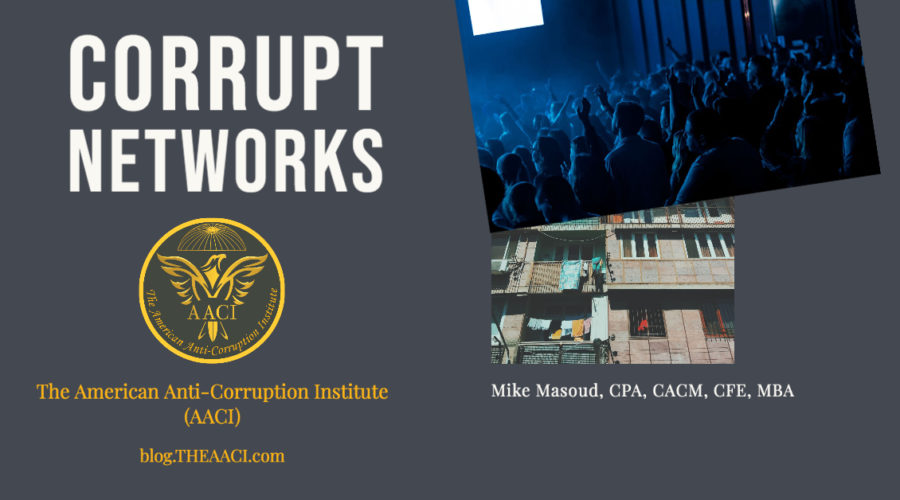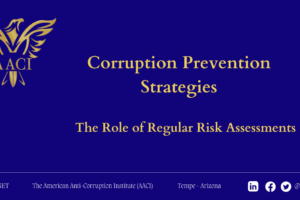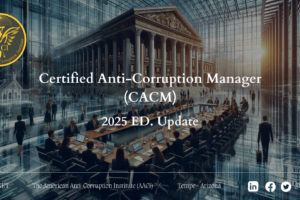April 30, 2020
Mike J. Masoud [note]Mike Masoud, CPA, CACM, CFE, MBA is the Sr. Director of The American Anti-Corruption Institute (AACI) in the Middle East and Africa. You may reach him at Mike@THEAACI.com[/note]
Networking is always necessary for human social, economic, and political development. The information and technology revolution created all sorts of communications people need to communicate and cooperate. Over the past 28 years, information technology, accompanied by its innovations, provided a new platform where corruption penetrates. The evolution of technological innovations created opportunities for many corrupt persons, institutions, and regimes: Corrupt Networking.

The American Anti-Corruption Institute (AACI) defines corruption as
“Abuse of power or perceived power or entrusted authority for direct or indirect private monetary or non-monetary gain.”
The American Anti-Corruption Institute (AACI)
It applies at all times. For example, it refers to the Enron scandal, Madoff Ponzi scheme, and those current schemes that make news headlines in all sorts of media.
Corruption has no religion. It also crosses cults, religions, beliefs, and states. Therefore, corruption networks are growing, using whatever facilitates their work. They use social networks and all Internet communication services in all stages of their corruption. Their networks are complex. Though, there are certain qualitative characteristics of these corruption networks. Corrupt people
1- Are primarily driven by self-interest and greed.
2- Do not care about their countries as they are ready to sell anything of their countries to whoever offers what they need.
3- Do not have moral or ethical principles. They worship themselves and their interests.
4- Do not believe that there is a rule of law or an independent judiciary. They believe they are above the law.
5- Depend on their peers to fulfill their needs. This includes, but not limited to, influencing private citizens or public officials through bribery, extortion, or even threatening to kill.
6- Have their exchange currency and code of corruption!
7- Are always ranting and calling to fight corruption, but they are, in reality, rooted and persistent.
8- Always seek to control power or buy power to protect their ill-gotten funds and avoid accountability.
I am not surprised but rather understand how many leaders of the Third World countries sold their homelands to protect their thrones. These corrupt leaders can only rule their nations with corruption. So we see how their inner circles are rotten. In such countries, there is not a rule of law, and there is not the independent judiciary. Research shows that the more abundant the natural resources are in a country, the higher the corruption levels, especially in developing countries.
In her article, Look Out, Corruption Ahead, published on April 17, 2020, in the Atlantic magazine, Sarah Chayes excelled in describing the qualities of corrupt people and how they interact with each other. She said that “independent oversight is the bane of corrupt networks everywhere.” I believe that independent oversight is an important anti-corruption mechanism, but it is not enough. The real bane of corrupt networks is the effective implementation of the ten principles of fighting corruption [note] Read more. Mike Masoud, The 10 Principles of Figitng Corruption, American University of Beirut Medical Center, January 2020, https://blog.theaaci.com/an-anti-corruption-forum-the-10-principles-of-fighting-corruption/ [/note]
In my opinion, corruption fighters, including whistleblowers, worldwide must form their anti-corruption networks, utilize all kinds of social networking and communication, and expose corruption. I always advocate that the most effective fight against corruption is local. It also depends on local patriotic citizens whose anti-corruption intelligence[note] Read more on https://blog.theaaci.com/cacm-review-2020-ed/[/note] is appropriate.
###











































